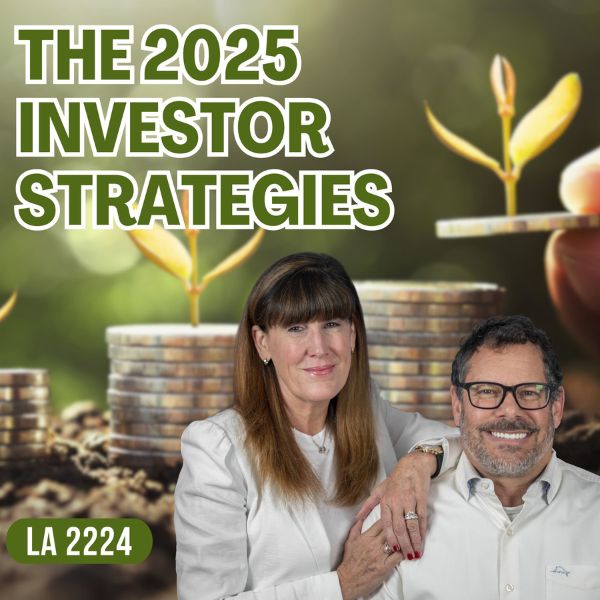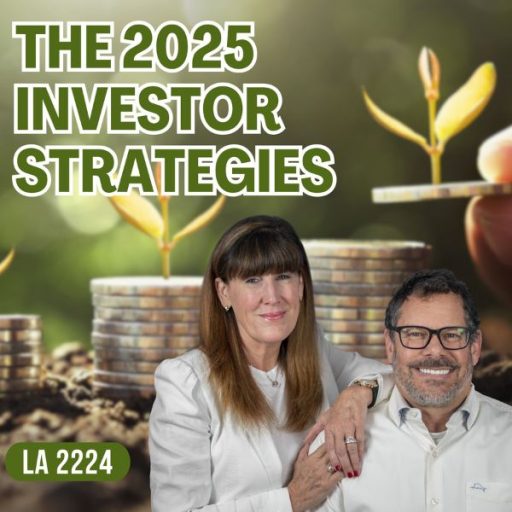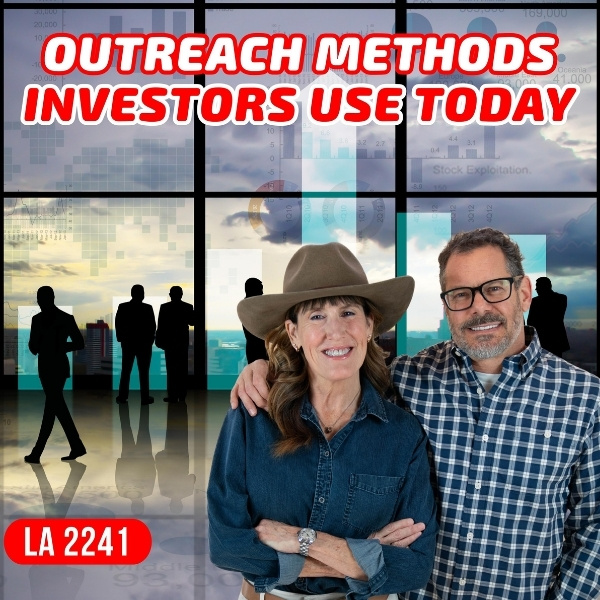The Need To Rethink Everything For 2025
This is episode 2224. Jill and I are talking about how to rethink everything. It is about our 2025 strategies for smarter mailers, markets, and your mindset.
This is important. In your land business, you’ve got some things that are working and some things that may have changed. You may be struggling a little bit. That’s what I want to talk about with you.
Our team at Land Academy has taken the time to express to us the questions and the things that are on our constituency’s mind, our Land Academy members’ minds. They put these topics together and asked us to spend the entire week on them. In the next episode, we’re calling it, “Is Your 2024 Playbook Broken? Fix Your Mail, Market, and Mindset for 2025.” My notes on that are how to adjust it for this year and some real-world advice on how Jill and I have adjusted it. Next is “From Stale to Scalable: 2025’s New Rules for Landmailers and Market Moves.” My notes on that are how to take advantage of it. Some stuff is changing. Change has historically done Jill and me very well.
We changed this hard in the beginning, and very profitable for us in the middle and the end. You have to embrace it. Next is “Mail Smarter and Think Bigger.” This is a huge key. Jill has been saying it forever. Add some zeros to what you’re purchasing and reselling. It is the 2025 investor reset you didn’t know you needed. Resetting your mind is what I’m going to talk about. She’s going to talk about adding zeros. Next is “Mindset Shift for 2025.” The old ways of land investing quite simply won’t work anymore. I’ll describe those because I’ve been through all of them personally. I’ve been through the last one with Jill. We’ll recap on that and show examples of how some stuff sucked and we made lemonade out of it.
The whole point for me is the reason you’re here. Jack has 30 years of this, full-time. I have 16 years, and we have 10 years with Land Academy. We’re watching people panic a little bit. Every time there’s a little something, everybody panics. We get it. This is not our first rodeo. That’s why you’re here. We can help you.
Panic is good. A little bit of upset is good.
It shakes things up. It would be boring. Home run deals would happen less frequently without some of this turmoil, change, and upset.
There is so much to talk about. Thanks for tuning in. Each day on the show, we answer a question from our Land Academy member Discord forum and take a deep dive into land-related topics at your request.
Navigating Your First Deal & Avoiding Financial Mistakes
Jordan wrote, “Hello, everyone. We officially closed on our first property. I don’t want to get ahead of myself. I’m already looking ahead to the sell side of things and have a couple of questions. First, once you reach an agreement with a potential buyer, do you typically rework the same purchase agreement you use when you acquire the property, or do you use a completely new one tailored for selling? Second, regarding closing costs, how do you usually split them when you’re the seller? As buyers, we’re accustomed to covering all the closing costs, but I imagine the dynamic is different when selling. Any insight you could offer would be greatly appreciated. I love to be as informed as possible, so I’m not scrambling when discussing terms with potential buyers. Thanks in advance for your help.”
Number one, it sounds like this is your first deal, first land deal, and first deal with Land Academy. It is a bunch of firsts. Because mindset is a big part of this week, I want you to truly absorb this. You’re going to screw it up. Are you going to lose money? Probably not. Is it going to be perfectly efficient? For sure not. While many people, and I might be sitting next to one of them, have issues with a lack of perfect efficiency, I want you to accept it. You have a huge community here. You started by asking a great question. It’s going to help us, you, and everybody. Don’t worry if you make some mistakes. Do you want to answer the first question, or would you like me to?
The first thing I’d like you to do is, on your next transaction, while you’re getting ready to close, already be getting ready to sell it. I don’t want you to close and go, “Now, what?” I want you to be pushing yourself along. Because you had some time while you’re waiting for escrow, pictures could have been taken, and all that stuff could have been done. Don’t worry about it, but I want to set you up for success on the next one.
That’s great advice. It should be one fluid thing.
It is just a system. This one is getting ready to close. We need the photos. We need the description. Are we going to go with a broker? How’s it going to happen? The day you close, it’s for sale. That’s what I want you to strive for. That’s your goal. You did nothing wrong. This is all a learning process, but that’s going to be the goal.
You did everything right.
The same purchase agreement with a new name on it is fine. That’s all you needed. Remember to open escrow when you bought it. That’s all you needed to open escrow when you sell it. Don’t sweat any of that. Do you want me to go on to the next one?
I’m assuming you’re closing and reselling through escrow. Once you submit that purchase agreement to the escrow agent, “Here’s the buyer. Here’s the seller. We’ve signed the thing. Here’s the price.” That kicks off. The escrow agent starts now to complete the transaction, complete the acquisition for you, and that’s all they should need. They should take that purchase agreement. You should get an escrow number within minutes.
Theoretically, Jack is right. It could be minutes, but usually it takes a couple of hours or a day. They’ll say, “I’ll get it to you in the morning.” Fine, I can understand that.
All these deals later, I still haven’t learned.
It’s okay. About the closing costs, I traditionally let it unfold. Most buyers are prepared to pay their fair share per that market or that industry when they buy. I let that go. That’s usually what I do. An escrow will go, “Here’s what the buyers usually cover. Here’s what the sellers usually cover.” Just roll with it. I don’t make any special concessions when it comes to that. Thinking ahead, on your next escrow, check with your title company when you open escrow on the buy side. See if there is anything you can do to set it up to save money on the sell side. That’s a huge bonus for you and your buyer.
There’s a closing document that you’ll review before everybody signs everything. If you’re old like me, you call it a HUD-1. If you’re newer, you call it a closing statement. On each side is how the prorations happen. Maybe there are tax prorations or the fees that are associated with each side of the transaction, and who pays what. On the bottom is what the net proceeds are, the amount that you have to write the check for or wire the money. On the other side is the net proceeds to the seller.
It’s all very automatic and consistent if you close with escrow. You go on to say, “Any insights you can offer would be greatly appreciated. I’d love to be informed as much as possible, and not scrambling.” Jill nailed it. Next time, make sure it’s one fluid transaction because, all throughout the acquisition process, you should be thinking about the sales process directly in your decision-making. Can I sell this thing fast? How much can I sell it for? Who’s going to buy it? Do I have a real estate agent ready to go that knows the local market way better than I do, so they can liquidate it?
The real estate agent in the perfect world should be saying things like, “I believe we can sell this quickly. I only need these few things from you. It sounds like you bought it for a great price. Let me know when I can get my photographer or my drone person out there. Maybe she’s here.” She’s going to make you responsible for that as the seller of the property. Get all that stuff lined up before you buy it.
I have funny stories of brokers calling me, going, “Can I do it now?” I’m like, “Stop it. Just give me a day. I don’t own it yet.” It’s like, “Can I do it now?” I’m like, “Hold on.” I call him on Friday morning. I’m like, “Go. We had it.” By Sunday, we will have three offers. That’s the goal. That’s what you’re striving for.
If you’re new, and you seem like you are, the first few deals need to be like that. The last thing you want is to make money mistakes. When I said earlier you’re going to make a bunch of mistakes, I didn’t mean money mistakes. I meant process mistakes, document mistakes, and all that. Even then, if Jill were doing it, she wouldn’t make any mistakes. That’s just how it is.
That’s hilarious. Trust me. I make a lot of mistakes in other areas. That’s funny. As a new person, you brought up a good point. As a new person, the number one thing you should be focused on is financial mistakes. It means you are so flipping picky that you let ten other deals pass off your desk because you are not 100% comfortable. On the eleventh one, you’re like, “I’m an idiot if I don’t do this one.” That’s the one you do, and you know you’re going to be fine. Even though you make all the mistakes, you’re still going to make money. It’s going to work out fine. You’ll go back and look at those other ten, going, “Maybe I’ll revive that one, that one, or that one. Now I know what I’m doing.”
Give me a circumstance when in life we’ve looked back on something and say, “Back then, if I knew what I knew now.”
All the time.
It is every single deal. It is every single thing in life.
It is every day.
The Historical Evolution Of Land Investing & Adapting To Change
This episode’s topic is “Rethink Everything: 2025 Strategies for Smarter Mailers, Markets, and Mindset.” Let’s take a few steps back. This is designed on my part to make you feel great, not bad.
Good, because a lot of people are worried, like, “I have a pen. I have money to take notes.”
Here’s a big picture summary. Stuff changed. It’s changing in this market. The entire real estate market is very different. Interest rates are weird. There is the federal government’s take on affordable housing and all kinds of stuff. There’s weird stuff going on. Everything that goes on in that environment trickles down to land. I’m used to it. Let’s take a few steps back and look at the market history in the late twentieth century.
I want you to think about how people bought and sold land before everybody sets their hair on fire, because there’s some change. How did people buy and sell land before the internet? This is what they did. They speculated. They made some guesses about where the properties are going to be worth more in a few years after they buy them. Some people would call that, “Make sure you buy land in the path of growth.”
That’s not so important to us anymore. It doesn’t even enter into our due diligence process. We’re concerned about, “Can I use it with the eight A’s? Is it awesome? Can I use it? I’m buying at a great price, so I can resell it for more.” People went along just fine up until around 2005. Let’s call it 2000, where the internet kicked in and created this new thing. This new thing, buying and selling land from your desk, is how and why Jill and I founded Land Academy. It makes it a lot easier, but it has changed.
I love what you just said. It used to be a long path. You had to buy it well because you knew you were going to sit on it for maybe ten years. In the path of growth, you’re like, “I know the mall is coming. It’s going to take that long.” I knew this, too. I know the airport is coming. I have lots of stories about LAX, the former location, and all the land that I bought from people cheaply because they thought they were playing the correct, long game. With the way you and I do it, it’s like, “I can make money on it right now in its current condition.” It is a little bit harder, albeit a little bit better.
We’re going to talk about history and what we’re faced with. In the next episodes, we’re going to talk about what to do about it. In the ’60s and ’70s, way before the internet, people would go to find out who owned property. They would walk into the county. They would open a book. They would look up the properties. It’s like a snail scenario. They would look up their properties that they’re interested in purchasing.
Maybe they had inside information, like Jill just said, because there’s an airport going there. For some reason, a big, laborious process, they would hand out letters to the people and say, “Give me a call. I want to buy your property.” The people who were receiving those letters, just like now, had probably inherited the property, didn’t care about it, and responded very well. The response rate was crazy. You send out ten letters and buy a few properties because no one was doing that.
They blazed the path. There’s a book about it called The Stephenson Model, or something like that. It’s way out of print. I tried to buy the rights to it because it’s so interesting, but without luck. It’s going down generations from the original author. Some stuff changes. The internet came in around 2000. All through the ’90s, my business model was to go to tax sales during this time, go to a literal auction in person, buy a bunch of tax sale properties, and resell them on eBay with huge success. A bunch of people found out about that. All of a sudden, a lot of people started showing up at these auctions.
It was no longer feasible for me to implement that business model at the velocity and the profit margin that I was doing it. Did I say it’s over? Did I run around with my hair on fire and say, “I guess the party’s over?” I didn’t. What I did was I knocked around for a couple of weeks and figured out that I could go to the county, get a list of owners, and send them mail. That’s what I did from around 2000 to 2009 or 2010. I was one of the first, if not the first person that I know of, at least in the Southwest, to go do that. I made it a lot easier when I discovered RealQuest.
Around 2004, RealQuest made it easy in the form that we do it now. Download huge lists. Manipulate them without the mental hell of buying a list from the county and taking it apart in a spreadsheet or in a relational database. That change carried us to around 2009 when Jill and I joined forces. That model had run its course. There was a time when I could send out 50 letters and buy 4 or 5 properties, good ones, and still resell them on the internet, mostly on eBay with self-close. Did I run around and say, “My hair is on fire. It’s over?” No.
What ended up happening was that Jill looked at this as an outsider. She looked at what I was doing and how much money I was making. In the most politically correct way, she said, “I don’t think that this works anymore. By the way, when’s the last time you talked on the phone with anyone? You haven’t. Your database is awful and a bunch of stuff.” She was completely right.
She retooled our business around 2009 and pushed us forward into a new direction, which is essentially what we have now. We’re changing it, and we want you to change along with us. She creates real estate deals. She gets on the phone with somebody who may say, “There’s no way I’m selling my property to you.” Fifteen minutes later, they’re talking about, “How much are you going to buy it for? What’s the price?” There’s a huge key component about Jill’s role in this.
Thank you.
Join us in the next episode where we discuss, “Is Your 2024 Playbook Broken? Fix Your Mail, Market, and Mindset for 2025.” You are not alone in your real estate ambition. We are Jack and Jill, information and inspiration to buy undervalued property.















